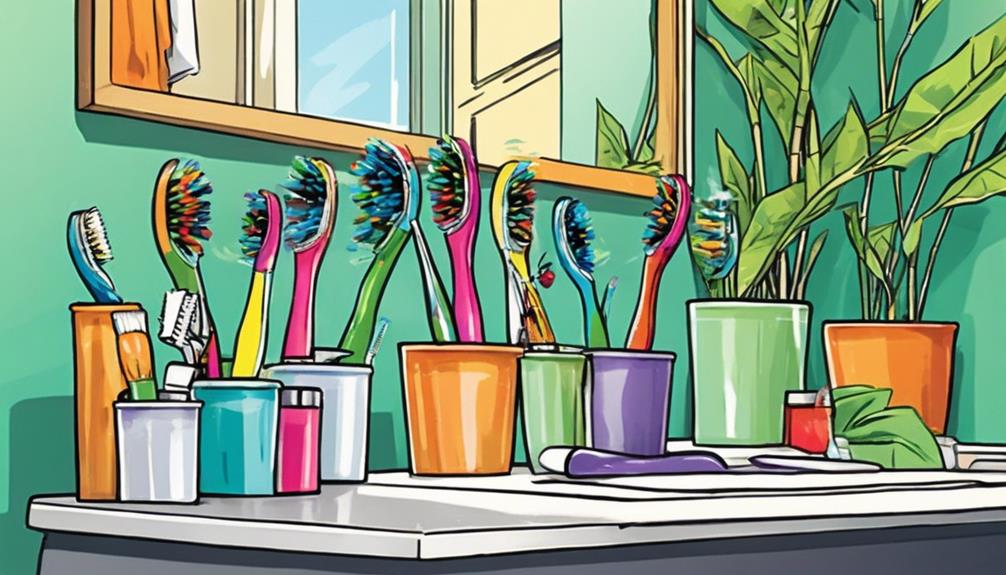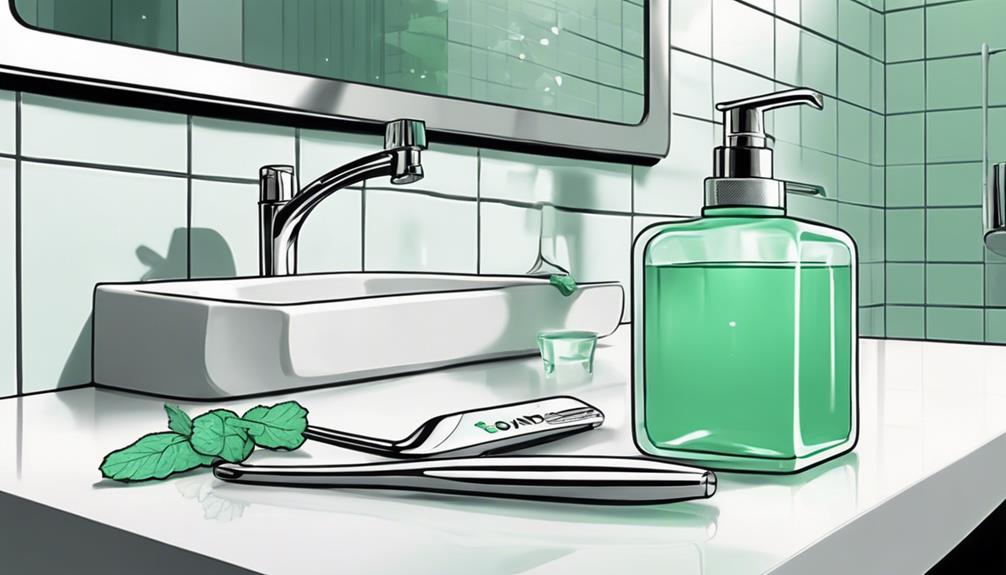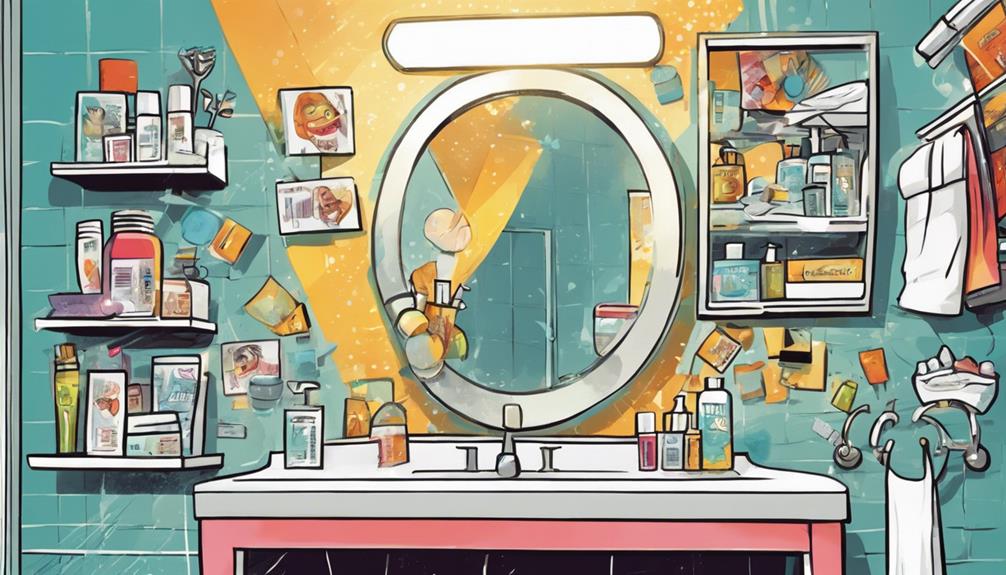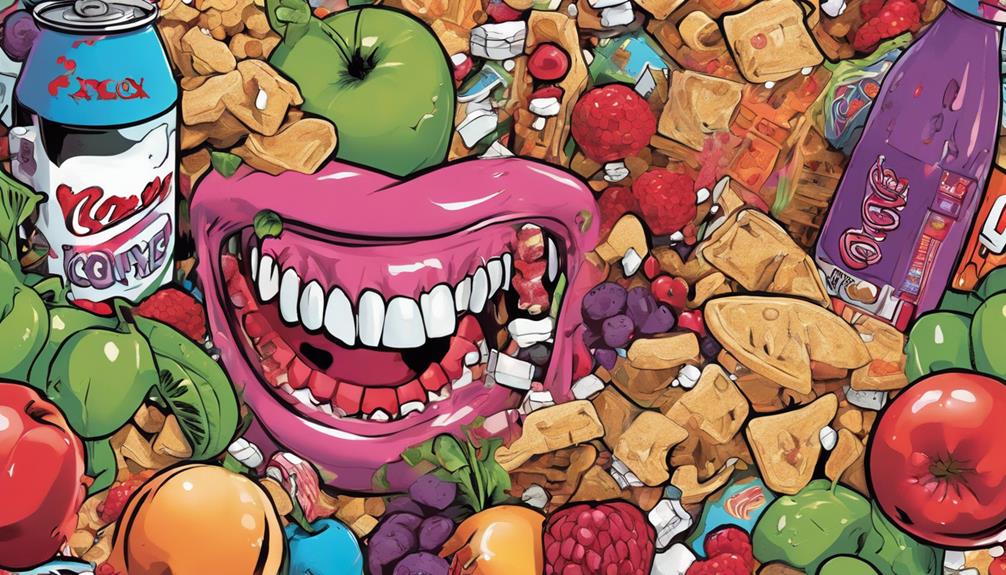Every home should have a dental scraper, as it's essential for maintaining ideal oral hygiene. This simple tool allows you to remove plaque and tartar effectively, especially from hard-to-reach areas. By using a dental scraper between visits, you can prevent gum disease and enjoy fresher breath. It's not just about cleaning; using this tool can reduce your dental visits and save you money in the long run. Plus, it encourages good habits for the entire family. Keep it handy for a cleaner mouth—you'll be surprised by the benefits you uncover!
Key Takeaways
- Dental Scraper: Essential for removing plaque and tartar, ensuring a deeper clean and preventing gum disease between dental visits.
- Electric Toothbrush: More effective at reducing plaque than manual brushes, promoting healthy dental habits and reducing cavity risks.
- Water Flosser: Reaches deep between teeth and along gum lines, enhancing mouth health and minimizing plaque build-up.
- Tongue Scraper: Eliminates bacteria and freshens breath, contributing to overall oral hygiene.
Importance of Dental Scrapers

Dental scrapers are vital tools for anyone looking to maintain ideal oral hygiene by effectively removing plaque and tartar that brushing alone might miss. When you incorporate these tools into your dental care routine, you can greatly enhance your oral health.
Plaque and tartar can build up in hard-to-reach areas, leading to gum disease if left untreated. By using dental scrapers, you can target these stubborn deposits, ensuring your teeth remain clean and healthy.
Regular use of dental scrapers complements your brushing and flossing efforts, allowing you to achieve a deeper clean. These tools are designed with sharp, stainless steel edges, enabling precise scraping for both at-home and professional dental care.
When used correctly, dental scrapers help you maintain fresher breath and a cleaner mouth between dental visits, promoting overall oral hygiene.
It's important to handle dental scrapers with care, as good lighting and a steady hand are necessary to avoid damaging your gums during use. By integrating dental scrapers into your regular dental care routine, you can take proactive steps toward maintaining your oral health and preventing future dental issues.
Cost-Effectiveness of Home Tools

Incorporating home dental tools not only enhances your oral hygiene routine but also proves to be a cost-effective strategy for long-term dental health. By investing in tools like electric toothbrushes and water flossers, you can greatly reduce future dental expenses. These tools help maintain better oral health, minimizing the risk of cavities and gum disease that often lead to costly treatments.
When you adopt a preventive care approach with at-home dental tools, you empower yourself to manage your dental hygiene effectively. This proactive measure can save you thousands in potential dental repairs over time. Regularly using these tools allows you to perform maintenance between checkups, which might even reduce your visits to the dentist from twice a year to once a year, saving both time and money.
Moreover, having access to affordable dental tools is vital for individuals in remote or underserved areas. It enables them to maintain their oral health without relying on expensive dental interventions that may be difficult to access.
Family Benefits of Dental Care

When you prioritize dental care at home, you're not just taking care of your teeth; you're fostering healthy habits for your entire family.
Encouraging collective oral hygiene helps everyone, especially kids, learn the importance of preventive care.
This proactive approach can lead to better health and fewer dental issues down the road.
Promoting Collective Oral Health
How can promoting collective oral health within your family lead to healthier smiles and stronger bonds? By focusing on family dental care, you encourage everyone to take responsibility for their oral hygiene. Using dental cleaning tools together not only teaches children good habits but also reduces the risk of cavities for all family members. When everyone participates in the care of your teeth, you'll notice fewer emergency visits and lower dental costs over time.
Creating a routine around oral health fosters accountability and teamwork. When you engage in dental care practices as a family, it becomes a shared responsibility, reinforcing connections and creating a supportive environment. You can set aside time for brushing and flossing together, making it a fun activity rather than a chore.
Regular use of home dental tools can greatly lower the incidence of gum diseases and other oral health issues. So, by promoting collective oral health, you're not just ensuring healthier smiles; you're building stronger family bonds that last a lifetime.
Prioritizing oral hygiene as a family is a small effort that yields considerable benefits for everyone involved.
Preventive Care for Children
Preventive care tools, like electric toothbrushes and fluoride toothpaste, play an essential role in helping your children develop healthy dental habits early on. By integrating these tools into their daily routines, you're setting them up for a lifetime of good oral hygiene. Regular use of dental cleaning tools not only reduces cavities but also instills responsibility in your children regarding their dental health.
Here's a quick look at how preventive care benefits your family:
| Benefit | Description |
|---|---|
| Reduced Cavities | Regular use of dental tools greatly lowers cavity risk. |
| Improved Oral Hygiene | Children learn to maintain their own dental cleaning habits. |
| Cost Savings | Fewer dental visits mean less time and money spent on check-ups. |
| Decreased Dental Anxiety | Familiarity with dental tools lessens fear of the dentist. |
Engaging in collective dental care practices, like using dental floss and mouthwash, can further enhance your family's overall oral health. Teaching your children proper dental hygiene now leads to healthier smiles and a more confident future.
Reducing Dental Visits

Regularly using at-home dental tools can help you maintain excellent oral hygiene and considerably reduce the number of dental visits you need. Moreover, at-home dental tools such as water flossers and electric toothbrushes can help remove plaque and prevent gum disease. These tools can also save you money in the long run by reducing the need for costly dental procedures. In addition to using at-home dental tools, you can further enhance your oral hygiene routine by trying out a homemade toothpaste recipe, using natural ingredients like baking soda and coconut oil. By incorporating these practices into your daily routine, you can achieve optimal oral health and minimize the need for frequent dental visits.
By incorporating tools like electric toothbrushes and water flossers into your routine, you can effectively combat plaque build-up and keep your teeth cleaner between professional checkups. Studies show that diligent home care can cut the incidence of cavities and gum disease by up to 50%.
This means fewer trips to the dentist for treatments that could have been avoided with better at-home care. The American Dental Association even notes that practicing good oral hygiene can lead to commendations from your dentist during checkups, highlighting your improved oral health.
Families that consistently use dental tools can often extend the interval between professional cleanings from six months to once a year, saving both time and money.
With fewer dental visits needed, you'll not only reduce the risk of costly emergency treatments but also promote a healthier smile. So, invest in effective at-home dental tools, and watch your dental visits decrease while your oral hygiene improves!
Essential Dental Tools Overview

When it comes to maintaining your oral health, having the right dental tools at home is key.
Regular use of essential tools like an electric toothbrush and dental floss can greatly boost your hygiene routine.
Let's explore the benefits of these tools and how to choose the right ones for your needs.
Essential Home Care Tools
Essential home care tools like electric toothbrushes, fluoride toothpaste, and water flossers are vital for maintaining ideal dental hygiene. By investing in these essential cleaning tools, you can enhance your oral hygiene routine and contribute to your overall health.
Here's a quick rundown of must-have items:
- Electric Toothbrush: More effective than manual brushes at removing plaque and promoting gum health.
- Fluoride Toothpaste: Strengthens enamel and prevents cavities; choose wisely to avoid excess fluoride.
- Water Flosser: Cleans deep between teeth and along gum lines, perfect for those with braces or sensitive gums.
- Dental Picks: Handy for removing food particles and plaque that brushing alone might miss.
Incorporating these tools into your daily practice won't only improve your oral hygiene but also support your overall health. Regular use of these items can lead to a healthier mouth and a brighter smile, so make sure to keep them on hand for your home dental care routine.
Benefits of Regular Use
Using essential dental tools consistently keeps your mouth healthier, reduces plaque build-up, and minimizes the risk of dental issues. When you incorporate tools like electric toothbrushes and dental floss into your daily routine, you effectively combat plaque and tartar, creating a more favorable environment for your oral hygiene.
Adding a water flosser enhances your teeth cleaning by reaching areas traditional floss might miss, ensuring a thorough clean along the gum line. Daily mouthwash use further boosts your oral hygiene, targeting harmful bacteria while freshening your breath and protecting against cavities and gum disease.
Studies show that people who regularly use dental tools at home experience fewer emergency dental visits and lower overall dental costs, thanks to the preventive maintenance these tools provide. Additionally, practicing family-oriented dental care with these tools instills healthy habits in children, reducing their cavity risk and promoting lifelong oral health.
Incorporating these dental tools into your daily routine not only improves your mouth's health but also fosters a commitment to maintaining excellent oral hygiene for you and your family.
Choosing the Right Tools
Selecting the right dental tools can make a significant difference in your oral hygiene routine. By choosing effective products, you can enhance your dental care and prevent issues like cavities and gum disease. Here's a quick overview of essential dental tools you should consider:
- Electric toothbrush: More effective at reducing plaque than manual brushes.
- Fluoride toothpaste: Strengthens enamel and helps prevent cavities.
- Dental floss: Cleans between teeth, reaching areas brushing alone can't.
- Mouthwash: Targets specific issues like bad breath and enhances overall cleanliness.
Incorporating these tools into your daily routine can lead to healthier teeth and gums. An electric toothbrush, paired with fluoride toothpaste, guarantees plaque is effectively removed while bolstering your enamel.
Don't forget dental floss, as it's crucial for tackling those tricky spots between your teeth. A quality mouthwash can give you that extra layer of protection and freshness.
DIY Dental Care Solutions

DIY dental care solutions offer effective ways to maintain your oral hygiene with simple ingredients found right in your kitchen. By utilizing common kitchen items, you can create powerful cleaning tools that help protect your teeth and gums.
Here's a quick reference table for some easy DIY solutions:
| Solution | Ingredients | Benefits |
|---|---|---|
| Baking Soda Toothpaste | Baking soda, water | Removes plaque, gentle abrasive |
| Saltwater Rinse | Salt, warm water | Natural antiseptic, promotes gum health |
| Coconut Oil Pulling | Coconut oil | Reduces bacteria, freshens breath |
| Apple Cider Vinegar | Apple cider vinegar, water | Antimicrobial, balances pH |
Incorporating these DIY dental care solutions into your routine helps maintain oral cleanliness without harsh chemicals. Regular use can enhance your oral hygiene between dentist visits, reducing the need for frequent professional cleanings. These methods are especially beneficial for those in remote areas with limited access to dental care. So, grab those kitchen tools and start your journey towards better oral health!
Teeth Whitening Options

Teeth whitening options provide a range of solutions to brighten your smile and boost your confidence. Whether you're looking for quick results or gradual improvement, there's something for everyone. Here are some popular choices:
- Whitening Strips: Easy to apply and effective, using hydrogen peroxide to remove stains.
- Professional Whitening: Achieve up to 8 shades brighter in a single session with a dentist.
- Custom Trays: Professional-grade whitening gel in a personalized tray for ideal fit and effectiveness.
- Whitening Toothpaste: Daily use can help maintain brightness while promoting important dental hygiene.
When considering teeth whitening, it's important to monitor your enamel's health, as regular use of these products can lead to wear.
Follow instructions carefully to guarantee your teeth remain healthy while achieving a dazzling smile.
Investing in the right whitening solution not only enhances your appearance but also supports your overall dental hygiene routine.
Maintenance of Dental Tools

Maintaining your dental tools is just as important as choosing the right teeth whitening options to keep your oral care routine effective and hygienic. Start by regularly cleaning your dental tools after each use with warm, soapy water. This simple step prevents the buildup of bacteria and keeps your tools working their best.
Store your clean dental tools in a dry, clean environment, ideally in a protective case to avoid damage and contamination. It's also essential to inspect your tools frequently for any signs of wear or rust. If you notice any issues, replace them to guarantee peak performance and safety during use.
To further enhance the maintenance of dental tools, use a disinfectant solution to sanitize stainless steel instruments periodically, especially if they've come into contact with bodily fluids. Remember to handle sharp tools, like dental scrapers and picks, with care, and store them safely to prevent accidental injuries.
Choosing the Right Toothbrush

Choosing the right toothbrush can greatly impact your oral hygiene routine and help you achieve a healthier smile. Here are some key factors to take into account when selecting your toothbrush:
- Opt for soft bristles: They're gentle on your gums and enamel.
- Consider electric options: They often remove plaque more effectively and are user-friendly, especially for those with limited dexterity.
- Size matters: Choose a toothbrush that comfortably fits your mouth, ensuring you can reach all areas easily.
- Replace regularly: Change your toothbrush every 4 to 6 weeks or after any oral infection to avoid bacteria buildup.
Frequently Asked Questions
What Is the Most Important Tool for a Dentist?
When considering a dentist's essential tools, you can't overlook the dental mirror. It enhances visibility, allowing for accurate diagnoses and precise procedures. This tool's importance can't be overstated in ensuring effective dental care.
Should You Use Dental Tools at Home?
Imagine standing in front of the mirror, toothbrush in hand. Yes, you should use dental tools at home! They help maintain your oral hygiene, prevent costly dental visits, and keep your smile bright and healthy.
How to Remove Plaque at Home With Dental Tools?
To remove plaque at home, use a dental scraper gently on your teeth, followed by a dental pick to dislodge debris. Incorporate a fogless mirror for better visibility, ensuring you maintain proper technique to protect your gums.
Can I Clean My Teeth at Home Like a Dentist?
Did you know about 80% of dental issues stem from poor home care? While you can maintain your teeth at home, you can't replicate a dentist's thorough clean, so regular professional visits are still essential.
Is Homemade Toothpaste as Effective as Using a Dental Tool at Home?
Yes, you can make your own toothpaste, but it may not be as effective as using a dental tool at home. Professional dental tools can reach areas that a toothbrush or homemade toothpaste might miss, leading to better overall oral health.
Conclusion
Incorporating a dental scraper into your home care routine can be a game-changer for your family's oral health.
Not only does it help you maintain those pearly whites, but it also cuts down on costly dental visits.
Think of it as your secret weapon against plaque and decay, ensuring your smile shines bright.
So, grab that dental scraper and take charge of your dental care—because a healthy mouth is truly a treasure worth keeping!









